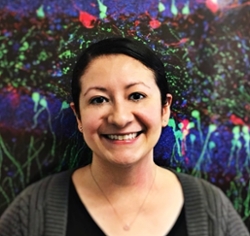Students Discover the World of Scientific Funding in Washington, D.C.

March 16, 2016
By Simon Goodacre | Graduate School of Arts and Sciences
Last year, the American Association for the Advancement of Science (AAAS) hosted its second conference on Catalyzing Advocacy in Science and Engineering (CASE) in Washington, D.C. The program included a three-and-a-half-day program to learn about Congress, the federal budget process, and effective communication of scientific ideas.
Two students from Brandeis, Veronica Flores and Delora Gaskins, attended the conference. Both are pursuing doctoral research in the sciences. “It’s a great conference for learning about how your government works,” says Flores. “We scientists sometimes do not realize that in a sense we are really government employees. We think about money coming from universities, agencies and research centers, but they are getting most of their funding from the government.”
The students learned about the allocation of congressional budgets to scientific agencies, such as the National Science Foundation (NSF) and the National Institutes of Health (NIH). There is not enough money to fund all of these agencies, so they must lobby for funding at meetings with Congress. “The only thing that matters is the person sitting at that table fighting for the money,” says Flores. “Many agencies lose funding because of lack of lobbying and lack of representation. Unfortunately, their productivity is not as important as the effectiveness of the person representing them in that room.”
After the workshops, the students met with staffers in Elizabeth Warren and Jim McGovern’s offices. “We are quite lucky in Massachusetts because the people working on behalf of scientific research in our representatives’ offices tend to have doctoral degrees in their areas of expertise” says Flores. One of the issues scientists face is explaining their research to Congressional Representatives in terms that they will understand. “Most of our Representatives are lawyers and businessmen. Some of them only have high school diplomas, so we need to communicate with them differently than we would with our peers.”
AAAS offered many professional opportunities to students at the conference, including working on Capitol Hill in congressional offices. There are also positions available at scientific agencies that need experts to interpret and communicate grants for the government. Flores and Gaskins met some students currently working in Washington, and Flores is hearing about what that type of work really entails. “I have put it in my notebook of possible careers. It’s something I feel equipped to do through my training at Brandeis.”
“The most important thing I learned at this conference is that scientists need to become more involved in policy,” says Flores. “Scientists need more people battling for us, and we need to understand that those people can be us. Researchers publish their findings and assume that their value is demonstrated because it’s public. We, as scientists, need to realize that the people in government who make funding decisions might not be in touch with science in the same way that we are. There were moments when we were aghast, but it is something that all scientists really need to understand. This program made me really think about how and where my research funding comes from.”






